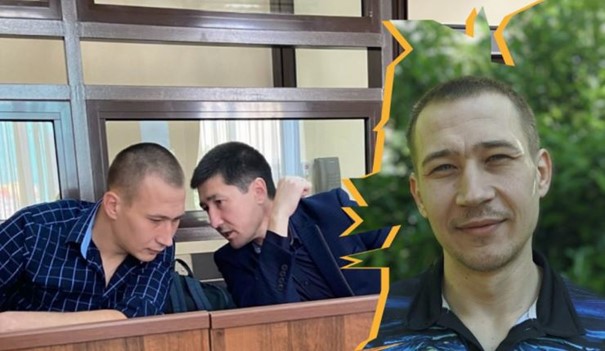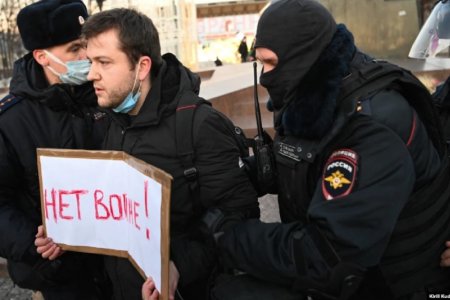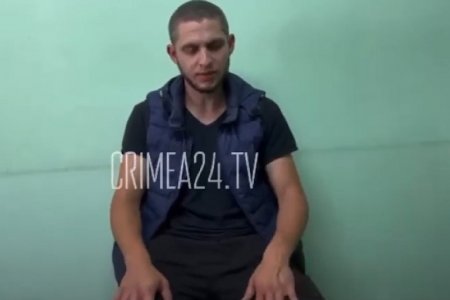
Oleksandr Tarapon has become the first Ukrainian in Russian-occupied Crimea to receive a prison sentence on criminal charges which Russia hastily adopted in March this year to try to silence protest over its full-scale invasion of Ukraine. Tarapon was sentenced to two and a half years in a harsh-regime prison colony after posting a placard with the words ‘‘War criminal and child killer’ on the gate of a relative who was directly involved in Russia’s invasion of Ukraine. It was claimed that this constituted circulation of ‘knowingly false information about a member of the Russian Federation armed forces’. Tarapon denied the charges, and his lawyer will be appealing against the sentence.
According to the opposition Telegram channel NetFreedoms, Tarapon’s ‘trial’ began in July at the Alushta occupation municipal ‘court’. Russia’s Investigative Committee had initiated criminal charges under Article 207.3 § 1 of the Russian criminal code, one of the additions to Russian criminal and administrative legislation adopted just ten days after Russian forces began their full invasion of Ukraine. The charges were in connection with Tarapon’s act of protest on 28 March when he attached a photo from Instagram of Yury Orlenko, a member of the Russian Rosgvardia and Tarapon’s relative on Orlenko’s gate. The caption, which used the symbols ‘Z’ and ‘V’ associated with Russia’s aggression, read: “A war criminal and child killer lives here.’ It is literally this caption which is alleged to have been “knowingly false information” and to have led to a significant term of imprisonment. Worth noting that the Russian legislation is so draconian that NetFreedoms resorted to stars and word definitions in order to explain what the placard said.
The prosecution claimed that this had created a false impression which compromised soldiers of the armed forces and Rosgvardia. It had supposedly “distorted information containing data about the use of the RF armed forces and their representatives, and specifically Y.I. Orlenko for the purpose of defending the interests of the Russian Federation and its citizens, and of support for international peace and security [sic!]”
In fact, the original amendments only covered information about Russian armed forces, with the relevant addition to include Rosgvardia only introduced on 5 April 2022. The law, even under Russian occupation, is not retrospective, however both prosecutor and ‘court’ ignored the fact that the placard had been posted about a Rosgvardia fighter before the legislation had been changed to include those like him.
Tarapon rejected the charges. He said in ‘court’ that he had posted the placard hoping that Orlenko’s wife would see it, phone her husband and demand that he return home. Orlenko clearly did not do so, and during the ‘trial’ was killed in the war.
The ‘prosecutor’, D. N. Shkil, had demanded a sentence of two years in a harsh-regime prison colony, with ‘judge’ Aleksandr Vladimirovich Zakharov on 21 October making the sentence even longer.
Ukraine’s Representative Office on Crimea reports that Oleksandr Tarapon was born in Alushta. Even before the fake ‘referendum’ that Russia staged in March 2014 (to try to legitimize its invasion and annexation), Tarapon had actively sought to counter Russian propaganda. He had posted the above placard in response to the information about the mass war crimes being committed by the Russian army on Ukrainian soil. His wife, Adele, had provided psychological support for Ukrainians caught up in the military conflict and had herself been subjected to administrative prosecution and fines.
Oleksandr himself was detained during the early hours of 31 March 2022, just days after he posted the placard and five days before even Russian legislation criminalized what they claim to be ‘fakes’ about Rosgvardia.
Although Tarapon appears to be the first person to have been convicted under Article 207.3 of the Russian criminal code over so-called ‘fakes’ about the war, several other Ukrainians in occupied Crimea are also currently facing ‘trial’ on criminal charges linked with expressing their opposition to the war.
Valeria Goldenberg, a retired electrician, was sentenced on 7 June to two years’ imprisonment in a low security prison colony. She had been charged with desecrating a grave after she daubed blood and faeces (from her hens) over the portrait in military gear of Valentin Isaichev, a 21-year-old marine killed fighting for Russia in its war against Ukraine, and over the wreaths, including one from the Russian defence ministry (details here).
Bohdan Ziza (Azizov), a 27-year-old artist from Yevpatoria, has been in detention since his protest against Russia’s total invasion of Ukraine. He was detained after daubing blue and yellow paint over the entrance to the Yevpatoria administration building on 16 May. He is also accused of having tried to throw a Molotov cocktail at the building, although there do seem some grounds for doubting the latter charge (details here).
On 14 October, a 30-year-old Ukrainian from Kerch was detained on charges of “wishing the death of Russian soldiers’. The FSB claims that comments in social media which were clearly aimed only at protesting against the war were calls to commit acts of violence. The woman is now facing a potential five-year sentence under Article 280 § 2 of Russia’s criminal code, as well as administrative charges for supposedly discrediting the Russian armed forces.
The President’s Representative Office reports that there are known to have been 142 administrative prosecutions over supposed ‘discrediting of the armed forces’. As reported, several cases have resulted in people being detained for up to 15 days, with such ‘administrative arrests’ for as little as playing a Ukrainian patriotic song at a wedding or singing it in a video posted on social media. Others have faced fairly steep fines, with some of these imposed after armed searches of the person’s home and their being taken away for interrogation.



